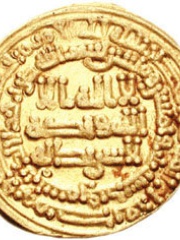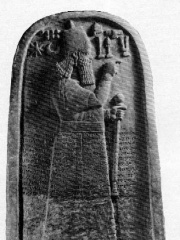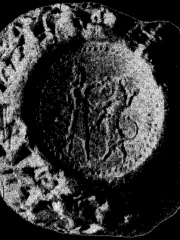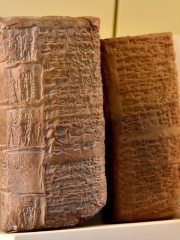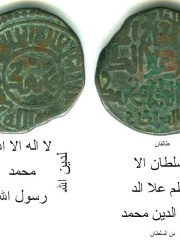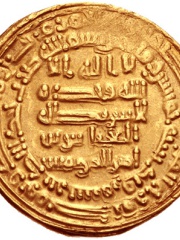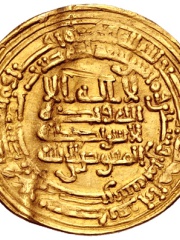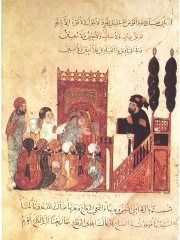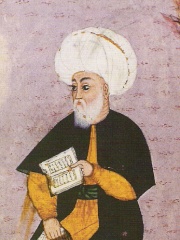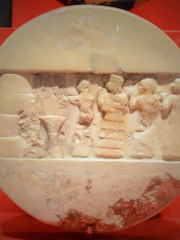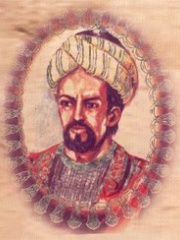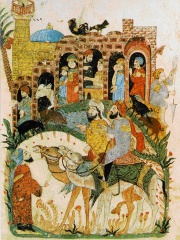WRITER
Ibn Sirin
653 - 729

 Ibn Sirin
Ibn Sirin
Muhammad Ibn Sirin (Arabic: محمد بن سيرين, romanized: Muḥammad Ibn Sirīn) (born in Basra) was a Muslim tabi' as he was a contemporary of Anas ibn Malik. He is claimed by some to have been an interpreter of dreams, though others regard the books to have been falsely attributed to him. Once regarded as the same person as Achmet son of Seirim, this is no longer believed to be true, as shown by Maria Mavroudi. Read more on Wikipedia
His biography is available in 22 different languages on Wikipedia (up from 19 in 2024). Ibn Sirin is the 1,081st most popular writer (down from 1,058th in 2024), the 105th most popular biography from Iraq (down from 101st in 2019) and the 8th most popular Iraqi Writer.
Memorability Metrics
Page views of Ibn Sirin by language
Among WRITERS
Among writers, Ibn Sirin ranks 1,081 out of 7,302. Before him are Bolesław Prus, Michel Tournier, Tavo Burat, Bernard-Henri Lévy, Edith Wharton, and Pierre Louÿs. After him are Aleksey Konstantinovich Tolstoy, Dubravka Ugrešić, Yakub Kolas, Henry Wadsworth Longfellow, Karl-Maria Kertbeny, and Harriet Jacobs.
Most Popular Writers in Wikipedia
Go to all RankingsBolesław Prus
1847 - 1912
HPI: 67.65
Rank: 1,075
Michel Tournier
1924 - 2016
HPI: 67.64
Rank: 1,076
Tavo Burat
1932 - 2009
HPI: 67.64
Rank: 1,077
Bernard-Henri Lévy
1948 - Present
HPI: 67.63
Rank: 1,078
Edith Wharton
1862 - 1937
HPI: 67.63
Rank: 1,079
Pierre Louÿs
1870 - 1925
HPI: 67.63
Rank: 1,080
Ibn Sirin
653 - 729
HPI: 67.63
Rank: 1,081
Aleksey Konstantinovich Tolstoy
1817 - 1875
HPI: 67.62
Rank: 1,082
Dubravka Ugrešić
1949 - 2023
HPI: 67.62
Rank: 1,083
Yakub Kolas
1882 - 1956
HPI: 67.62
Rank: 1,084
Henry Wadsworth Longfellow
1807 - 1882
HPI: 67.61
Rank: 1,085
Karl-Maria Kertbeny
1824 - 1882
HPI: 67.61
Rank: 1,086
Harriet Jacobs
1813 - 1897
HPI: 67.61
Rank: 1,087
Contemporaries
Among people born in 653, Ibn Sirin ranks 1. Among people deceased in 729, Ibn Sirin ranks 1. After him is Osric of Northumbria.
Others Born in 653
Go to all RankingsOthers Deceased in 729
Go to all RankingsIn Iraq
Among people born in Iraq, Ibn Sirin ranks 105 out of 384. Before him are Ibn Qutaybah (828), Muhammad al-Shaybani (750), Al-Mu'tazz (847), Adad-nirari I (-1400), Sin-shumu-lishir (-700), and Sin-Muballit (-1900). After him are Al-Nasir (1158), Al-Musta'in (836), Ahmad ibn Tulun (835), Al-Mustansir (1300), Pacorus II (50), and Ibn al-Jawzi (1116).
Others born in Iraq
Go to all RankingsIbn Qutaybah
RELIGIOUS FIGURE
828 - 889
HPI: 68.10
Rank: 99
Muhammad al-Shaybani
LAWYER
750 - 805
HPI: 67.98
Rank: 100
Al-Mu'tazz
SOCIAL ACTIVIST
847 - 869
HPI: 67.97
Rank: 101
Adad-nirari I
POLITICIAN
1400 BC - 1274 BC
HPI: 67.88
Rank: 102
Sin-shumu-lishir
POLITICIAN
700 BC - 627 BC
HPI: 67.79
Rank: 103
Sin-Muballit
POLITICIAN
1900 BC - 1793 BC
HPI: 67.66
Rank: 104
Ibn Sirin
WRITER
653 - 729
HPI: 67.63
Rank: 105
Al-Nasir
POLITICIAN
1158 - 1225
HPI: 67.58
Rank: 106
Al-Musta'in
POLITICIAN
836 - 866
HPI: 67.52
Rank: 107
Ahmad ibn Tulun
POLITICIAN
835 - 884
HPI: 67.50
Rank: 108
Al-Mustansir
POLITICIAN
1300 - 1261
HPI: 67.42
Rank: 109
Pacorus II
POLITICIAN
50 - 105
HPI: 67.40
Rank: 110
Ibn al-Jawzi
WRITER
1116 - 1200
HPI: 67.35
Rank: 111
Among WRITERS In Iraq
Among writers born in Iraq, Ibn Sirin ranks 8. Before him are Fuzûlî (1494), Ahmad ibn Hanbal (780), Enheduanna (-2300), Ahmad ibn Fadlan (900), Berossus (-400), and Al-Mutanabbi (915). After him are Ibn al-Jawzi (1116), Ibn Khallikan (1211), Karim Findi (1946), Ibn al-Nadim (1000), Al-Khalil ibn Ahmad al-Farahidi (718), and Al-Hariri of Basra (1054).
Fuzûlî
1494 - 1556
HPI: 78.46
Rank: 2
Ahmad ibn Hanbal
780 - 855
HPI: 78.16
Rank: 3
Enheduanna
2300 BC - 2300 BC
HPI: 74.16
Rank: 4
Ahmad ibn Fadlan
900 - 960
HPI: 73.87
Rank: 5
Berossus
400 BC - 300 BC
HPI: 70.12
Rank: 6
Al-Mutanabbi
915 - 965
HPI: 68.51
Rank: 7
Ibn Sirin
653 - 729
HPI: 67.63
Rank: 8
Ibn al-Jawzi
1116 - 1200
HPI: 67.35
Rank: 9
Ibn Khallikan
1211 - 1282
HPI: 67.09
Rank: 10
Karim Findi
1946 - Present
HPI: 66.74
Rank: 11
Ibn al-Nadim
1000 - 995
HPI: 66.44
Rank: 12
Al-Khalil ibn Ahmad al-Farahidi
718 - 790
HPI: 64.98
Rank: 13
Al-Hariri of Basra
1054 - 1122
HPI: 63.82
Rank: 14















